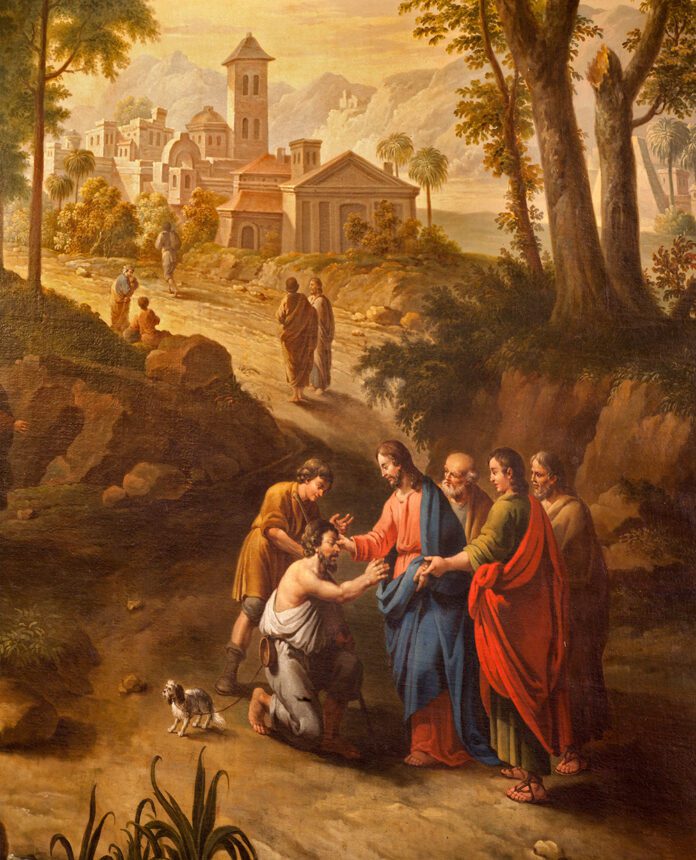The healing of blind Bartimaeus is a beautiful account of our Lord meeting a beggar in the lowest place (Jericho is quite literally the lowest city, at over 800 feet below sea level) and calling him to draw near that he might receive the gift of sight. The call of Jesus gives our beggar courage, and leaving behind all he holds dear, Bartimaeus makes his request in a spirit of faith. All who hear this story are meant to immediately understand that we too, share in blindness, even if not physically. We all need courage to come to Jesus, to ask, and to receive His gifts. But there is far more to this story.
Mark takes the unusual step of naming Timaeus as the father of Bartimaeus. In Hebrew, the prefix Bar means “son of.” Thus, Bartimaeus literally means “son of Timaeus.” In this case, we have a mixing of languages, which can lead us to some interesting points for meditation. Timaeus is a Greek name, meaning “highly prized,” or “honor.” And so Bartimaeus can reasonably be translated as “son of honor.” Some scholars have traditionally noted, though, that with the Hebrew prefix Bar, the name Timaeus may come from a Hebrew verb tame, meaning “to become unclean,” which in turn would render Bartimaeus as “son of uncleanness.” Given the blindness of our beggar, son of uncleanness might make sense. For blindness in Scripture is attributed to sin. Sin defiles the soul, but can also have visible, physical consequences. Bartimaeus is an incarnation of the consequence of sin. Wrapped in his cloak outside the lowest city on earth, Bartimaeus is unable to see a way forward save in crying out to Jesus for mercy.
Before we continue, there is another wrinkle worth noting. Whether Mark was aware of this is unclear, but there is a figure called Timaeus in a dialogue written by Plato some 360 years before Christ’s time. Plato depicts Timaeus as one who articulates the case that the world and all that is in it was made by a demiurge, that is, a god who can cause things to become, and Timaeus refers to this demiurge as the father and maker of the universe. The human soul, he says, is able to understand both creation and the creator, and the human body supports that capacity for understanding, especially through the eyes. With our eyes we behold the world, and so come to understand the father and maker of the universe. Perhaps Mark names Timaeus to call to mind both a philosophical figure who intuited the existence of God and the original sin of Adam and Eve. Through the human generations, that original sin which blinds us to God’s goodness, presence, and even existence, continues to show itself in our lowliness and uncleanness, such that we find ourselves seated beside Bartimaeus at the gates of Jericho.
Aware of our sinfulness, aware of our lack of knowledge, we may feel very stuck. We may from time to time feel that we are at the lowest possible point. But Jesus calls to Bartimaeus. Hearing the voice of Jesus, the crowd turns to the beggar and begins to echo the call. “Take courage! He is calling you!” Mark tells us that Bartimaeus throws off his cloak, leaps to his feet, and goes to Jesus. Some commentators speculate that Bartimaeus is throwing off the cloak of the philosophers (though I suspect that some of the great Catholic philosophers like Sts. Anselm, Augustine, Thomas Aquinas, and John Paul II would suggest that the cloak of philosophy is perfectly acceptable). He moves to Jesus though he cannot see and there, standing face to face with the Lord, receives his sight. He does not return to his cloak, to his lowly seat outside the city gates, but now follows Jesus up and out of Jericho and toward Jerusalem, the City of God. Once the son of uncleanness, Bartimaeus is being restored to his true dignity as a highly prized, honored, and beloved son, a son who like his first father, can recognize and walk with the father and creator of the universe.
Take courage, He is calling you! The Gospel today allows us to take the place of Bartimaeus. Recognizing our blindness, that is, our sin, we will recognize that only the mercy and healing power of Christ can save us. And so the cry of the beggar becomes ours: Son of David, have pity on me! Listen, for Jesus calls to you and to me, just as he called through the great crowd to the man seated at the gate. Jesus stops in his tracks to give Bartimaeus his attention, and just so, He stops for you. Unclean though sin has made us, our Lord wants to restore us to the honor and dignity we had in the beginning. Let us then make our request – Lord, I want to see – and follow Him on the way.






